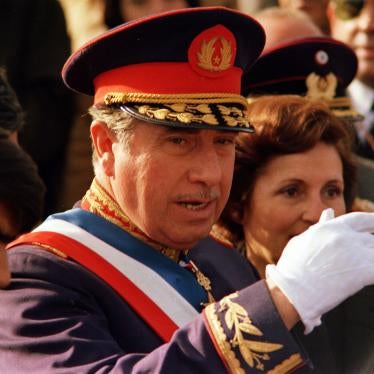(Washington, D.C.) - Human Rights Watch today called on President Ricardo Lagos to veto a proposed constitutional amendment that would give former presidents immunity from criminal prosecution. The bill, approved by both chambers of Congress during the final months of the Frei administration, allows former dictator Gen. Augusto Pinochet to retire from his position as lifetime senator, without forfeiting his parliamentary immunity. The bill is likely to be endorsed in a joint congressional session on March 25, and could become law unless Lagos withdraws his support.
Human Rights Watch warned that the proposed revision could have a serious, if unintended, impact on the criminal prosecution of General Pinochet. The former dictator faces more than seventy law suits in Chile for extrajudicial executions, "disappearances," and torture. The Santiago Appeals Court must now rule whether Pinochet's parliamentary immunity should be lifted so that he may stand trial. If the court rules that it should, Pinochet may appeal to the Supreme Court. If the appeals court finds in favor of Pinochet, the case against him cannot progress further.
Human rights lawyers representing Pinochet's victims fear that the reform could give Pinochet an extra layer of protection if he were now to resign from the Senate, since no explicit provision exists in Chilean law for lifting the immunity of a former president. "This reform represents untested ground, and it could offer a legal loophole for Pinochet," warned Jose Miguel Vivanco, executive director of Human Rights Watch's Americas Division.
The broader impact of the reform also worried Human Rights Watch. Most Latin American constitutions give members of the legislature and/or public officials immunity from arrest or prosecution, but these privileges terminate when they leave office and are designed to allow them to carry out their legitimate public responsibilities. No country offers immunity to former heads of state. "This is a very dangerous precedent for the region," said Vivanco. "It goes against the increasingly widely accepted principle that heads of state must answer for human rights violations before the courts. Immunity cannot be handed out as a prize to former rulers, even good ones."
Apart from offering General Pinochet an incentive to resign from the Senate, the reform is intended to rectify the situation of former President Patricio Aylwin (1990-1994). Under Chile's 1980 Constitution, Aylwin did not qualify for the benefits due lifetime senators since he served only a four-year term. There has been almost no debate in Chile about the long-term implications of the constitutional amendment.






